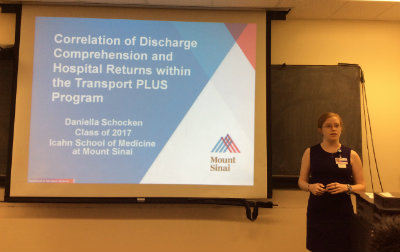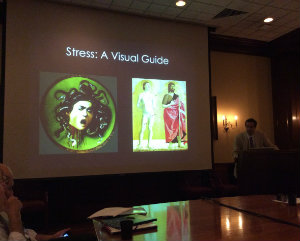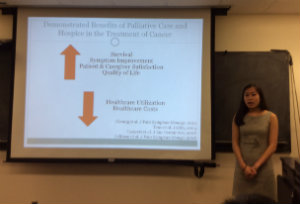 Daniella Schocken, a student at the Icahn School, presents on her research on a Mount Sinai emergency department program that deploys EMTs to help older adults transition home after hospitalization.
Daniella Schocken, a student at the Icahn School, presents on her research on a Mount Sinai emergency department program that deploys EMTs to help older adults transition home after hospitalization.What did you do for summer vacation? While many of us head to the beach or elsewhere to relax and get away from it all for a while, 149 enterprising students across the country instead devoted the break between their first and second year of medical school to learning about geriatrics and aging research.
Through the Medical Student Training in Aging Research (MSTAR) program, these future physicians engaged in geriatrics training and a mentored research experience at medical schools with outstanding geriatrics programs.
Many of these MSTAR scholars will ultimately choose a career in academic geriatrics, producing cutting-edge research and training the next generation of physicians in good care of older adults. No matter what their future specialty, all of them should be able to utilize their experience to provide better care to their older patients and help their colleagues do the same.
This past week, I had the privilege of attending presentations from students at Weill Cornell Medical College and the Icahn School of Medicine at Mount Sinai in New York City. It’s inspiring to hear these MSTAR scholars discuss the urgent need to improve health care for older adults. And these students have already begun making contributions to the field in a wide range of important geriatric topics.
For example, Daniella Schocken, a student at the Icahn School, has been analyzing data from a new intervention developed out of the Mount Sinai emergency department that deploys EMTs to help with the dangerous transition for older adults going home after hospitalization (I previously wrote about this program on Health AGEnda.)
 Matt Schelke, a student at Cornell, presents his research on a protein that potentially increases stress resilience.
Matt Schelke, a student at Cornell, presents his research on a protein that potentially increases stress resilience.Matt Schelke, a student at Cornell, presented his research on a protein called BAG-1 that potentially increases stress resilience. He made an eloquent case for how clinical research, such as that on disease burden and stressful stimuli that affect the health of older patients, can work in concert with basic science research like his on the cellular and molecular pathways related to stress.
Brian Park, at Mount Sinai, also focused on basic research and simulated Alzheimer’s disease in worms to better understand certain protein interactions. This was while his colleague, Cindy Yim, concentrated her summer work on better understanding Medicare beneficiaries with advanced heart failure and their decisions to enter hospice.
And Christopher Reisig took advantage of the amazing mentors in elder abuse research at Cornell and spent his summer helping to develop a comprehensive database that will assist in the identification of elder abuse victims by injury patterns observed in the emergency room. Cornell’s partnership with the Brooklyn district attorney’s office is making this possible, and it’s heartening to see that Christopher and his fellow MSTAR students are learning how to be partnership builders and creative problem solvers, as all good geriatricians are.
 Cindy Yim, a student at Mount Sinai, presents her research on Medicare beneficiaries with advanced heart failure and their decisions to enter hospice.
Cindy Yim, a student at Mount Sinai, presents her research on Medicare beneficiaries with advanced heart failure and their decisions to enter hospice.The MSTAR program is administered by the American Federation for Aging Research (AFAR), one of our long-time grantee partners. And while a partnership with the National Institute on Aging (NIA) will ensure most of the funding for student stipends over the next few years, AFAR is actively fundraising to support the program’s infrastructure and sustainability.
If you were ever an MSTAR student, an MSTAR mentor, or if you just want to see a future where physicians are better prepared to care for older patients, please consider making a donation to the program. For more information or to make a donation, visit the AFAR Giving Opportunities page.
And while you may have missed the in-person presentations at your local medical school, you can get a similar feeling by reading entries from students themselves on AFAR’s Diary of an MSTAR Student blog or by watching a video about the program.
I’m sure you will be as inspired and impressed as I have been with these MSTAR scholars and their work to improve the health of older adults.
